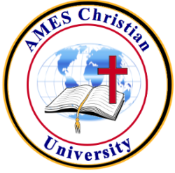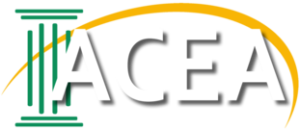
AMES Christian University
Accreditation
If you have any questions, please feel free to call us:
Mon-Sat 9:00 a.m.- 9:00 p.m. EST
1 (800) 899-9620 Ext 1
![]()
As a non-profit Christian institution established in March 2002, the goal and purpose of AMES Christian University has always been to train and equip our learners by providing ministry leadership training through distance learning. Our programs are created from the highest curriculum standards within the framework of Spirit-empowered, biblical authority enabling our learners to be challenged with spiritual passion and personal fulfillment. For that reason our current accreditation is with Christian-focused agencies bringing integrity to our operations and the processes that result in AMES Christian degree programs.
We fully recognize that certain students have unique personal preferences and professional objectives that necessitate obtaining degrees from institutions accredited by the US Department of Education-approved agencies. Simultaneously, we acknowledge that many students find fulfillment in institutions with alternative accreditation methods, such as those rooted in biblical principles. Frequently, educational institutions that offer both biblical and secular degrees charge the same tuition fees for both programs. However, it’s essential to be aware that a biblical degree may not always seamlessly transfer into a secular degree program, even if the initial accreditation was secular.
We believe that the cost of secular accreditation can often become a significant financial burden when it is not a mandatory requirement for pursuing a career in ministry. Many individuals may find it challenging to afford this expense. It’s worth noting that numerous biblical colleges and universities typically do not hold secular accreditation. If your goal is to obtain a secular degree, we strongly recommend enrolling in an institution that possesses the necessary secular accreditation to ensure the recognition and transferability of your qualifications.
In the future, ACU MAY consider pursuing an affiliate membership with a faith-based US DOE-approved agency. However, affiliation is not equivalent to accreditation. With that in mind, we completely trust God to bring us students whose needs we can meet and help to fulfill their God-given call. As a result, we are delighted to have a diverse student body of committed, diligent, and creative learners whose desire is to fulfill the Great Commission and to work powerfully and effectively in their God-ordained ministry. Our learners enjoy the challenge of expanding their faith and practicing excellence in their educational pursuits. We are honored to have you consider joining them.
![]()
State of Florida Department of Education

Click here to see the FLDOE page on Religious Institutions
Our compliance letter from the FLDOE is valid until May 2024 and is available upon request. Their site is not showing the schools for some reason.
State Authorization In the United States of America, jurisdiction over degree-granting institutions rests with the individual state governments. Compliance with state regulations is the necessary condition for offering a legitimate, legal American degree. AMES Christian University grants degrees under the authority of the Florida State Board of Independent Colleges and Universities in compliance with Section 1005.06(1)(f), Florida Statutes. The state of Florida does not require regional or theological accreditation. Please Note: ACU as well as other Christian colleges are NOT required to be regulated by the Florida Department of Education (FLDOE); therefore, ACU is not listed with the FLDOE as a ‘regulated’ institution. ACU has received approval (authorization) as of 2003 from the FLDOE that ACU is in compliance with the statutes of the Florida State Board of Independent Colleges and Universities to offer legitimate, legal American degrees. ![]()

Academic Council For Educational Accountability
AMES Christian University (ACU) is also a member of the Academic Council For Educational Accountability, a non-governmental agency designed specifically to promote integrity among Christian colleges and universities. ACEA is a network of Christian educators and Christian training programs & schools. They exist to provide both credibility through accountability or credibility through association.ACEA provides accountability and evaluation without compromising AMES Christian University’s mission, vision, and calling.
More About Accreditation:
In the United States, accreditation of universities and seminaries is a voluntary process with accreditation granted by private, non-governmental agencies. Governmental agencies never provide theological or ministry accreditation. Additionally, there is no absolute ‘national’ standard for educational accreditation since the educational world is currently re-examining criteria for accreditation, focusing less on institutional inputs and more on educational outcomes. There is no such requirement as Federal or State accreditation of a religious institution because the civil government has no authority to regulate religious teachings or which certificates or religious degrees upon completion of such education may be issued. This is a matter of separation of Church and State. Politicians and civil authorities must never be allowed to officially endorse or disapprove directly or indirectly the beliefs and practices of churches or their schools. * Please keep in mind that many if not most Bible Colleges and Christian Universities do not have secular regional accreditation. We are a Florida private school which is different from a public school see below. AMES Christian University does not have a regional secular accreditation. If you are desiring to pursue a degree for secular employment, a degree with AMES Christian University may not be the right choice for you. ACU does not guarantee a job or ordination in any specific market or ministry. ACU is not listed at this time with a U.S. Department of Education-approved accreditation agency, and an ACU degree is NOT specifically suited for people pursuing secular jobs such as public school teachers, state university professors, and state-licensed counselors or psychologists, among other vocations requiring state licensing.
Tax Exempt Non-Profit Status:
AMES Christian University is a non-profit corporation located in the state of Florida, USA. It is recognized as a tax-exempt organization under Section 501(c)3 of the US Internal Revenue Code.
What separates AMES Christian University from the “diploma mills” springing up on the Internet? There are several standards that set AMES Christian University, and any legitimate institution, apart from the diploma mills: Curriculum Standards A legitimate institution sets real, definable curriculum standards, based on historical good practice, for each of its programs. Instructional Delivery A legitimate institution requires its learners to undertake instruction, either from its own faculty or from providers who have been accredited or approved based on a rigorous approval model. Authorization Legitimate authorization involves the institution placing itself under the oversight of a duly appointed, sanctioned approval body. A legitimate institution grants degrees under the authority of the government agency in the state or country in which it operates. Faculty Standards legitimate institution will contract with and employ faculty members who are appropriately qualified to teach in their disciplines, diverse in their educational backgrounds, and committed to academic excellence. As stated above AMES Christian University is a private school and does not have a regional secular accreditation. If you are desiring to pursue a degree for secular employment, a degree with AMES Christian University may not be the right choice for you. ACU does not guarantee a job or ordination in any specific market or ministry. ACU is not listed at this time with a U.S. Department of Education-approved accreditation agency, and an ACU degree is NOT specifically suited for people pursuing secular jobs such as public school teachers, state university professors, and state-licensed counselors or psychologists, among other vocations requiring state licensure. Thank you for giving us the opportunity to outline our approach to this very important issue. We wish you the best with your degree pursuit, and we look forward to serving you as an AMES Christian University learner.
![]() About Private Schools In Florida:
About Private Schools In Florida:
You have the right and the responsibility to select the appropriate school to meet your learning needs. No one knows your personal circumstances, special traits, needs, strengths and weaknesses better than you. If you are considering a private school, it is important for you to know some of the fundamental differences between private and public schools in Florida. Private elementary and secondary schools are not licensed, approved, accredited or regulated by the Department of Education. Florida’s private schools issue independent school diplomas that do not require approval from the state of Florida. Florida private schools establish their own system of school accountability, grading, reporting, and evaluating and are not included in the state’s measurement of public schools. Private elementary and secondary schools are structured as private corporations, churches or private businesses that only report directory information and the enrollment of compulsory attendance aged students to the Department of Education. Private schools are not subject to school definitions and requirements specified in education statutes and they are not under the jurisdiction of the Department of Education.







